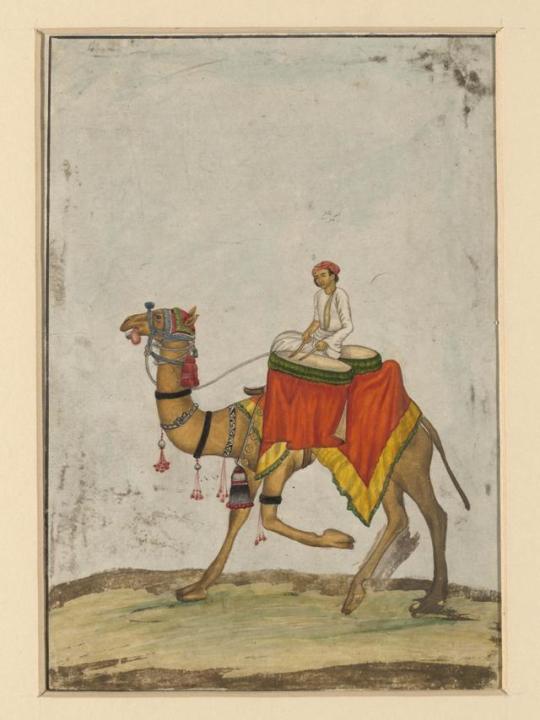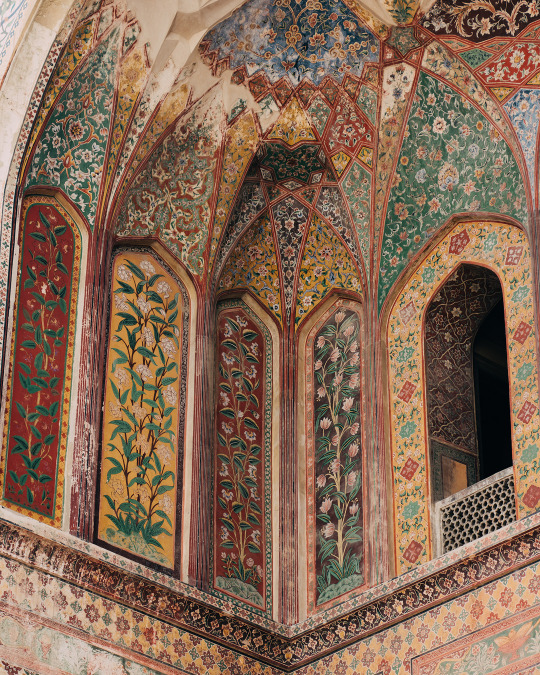hististan
28 posts
south asian & islamic history in photos & art
Don't wanna be here? Send us removal request.
Photo

A Camel and it’s Rider Playing Kettledrums Mazar Ali Khan Delhi, India, Mughal, c. 1840 Gouache © Victoria & Albert Museum, London One of six figures, this painting likely depicts the Mughal Emperor’s ceremonial procession on the occasion of Eid.
49 notes
·
View notes
Photo

Nur Jahan
India, Mughal, c. 18th century
Opaque watercolors & gold on paper
© Victoria & Albert Museum
51 notes
·
View notes
Photo

A Music Party
Abanindranath Tagore
Bengal, India, 1905
Watercolors on paper
A group of people sit and listen to a lady playing a sitar. The setting is that of a Mughal court, with Mughal style architecture in the background and the setting sun visible through the arches.
The artist, Abanindranath Tagore (1871 - 1951) was the pioneer and leading exponent of the Bengal School of Art, which flourished between 1905 and 1920. In his paintings, he sought to counter the influence of Western art as taught in art schools under the British Raj, by modernizing indigenous Moghul and Rajput traditions. His work became so influential that it was eventually accepted and regarded as a national Indian style.
371 notes
·
View notes
Photo

A Lady with a Child and a Dog attributed to Baijnath watercolor, opaque watercolor on paper 1800-1825 LACMA
28 notes
·
View notes
Text
“What Christine Fair et al are proposing is to educate Pakistanis about what the US thinks is good for them. For these political scientists, the right kind of Pakistani possesses the right kind of knowledge: Drone strikes are for his or her own good. It is with US intervention, through drones and propaganda, that Pakistanis can be saved from their backwardness, their tribalism, their Islamism, their nationalism — in short, themselves. But this kind of imperial experiment has been tried out before in South Asia. […] According to Fair et al, this is because not enough Pakistanis know that having their children, their houses and their funeral processions blown up by US drone strikes is actually a good thing for them. The reason they don’t know is because they don’t know English.”
— Sarah Waheed - Drones, US Propaganda and Imperial Hubris (via mehreenkasana)
82 notes
·
View notes
Photo

Jummah Mubarak 🌻 • Wazir Khan Mosque. Lahore, Pakistan. (Instagram: aabbiidd)
116K notes
·
View notes
Photo

intoxicated lady at a window late 18th century opaque watercolor and gold on paper brooklyn museum
208 notes
·
View notes
Photo

“Princess and Attendants on Balcony”,
Folio from the Davis Album Object Name: Illustrated album leaf Date: 17th century Geography: India Culture: Islamic Medium: Ink, opaque watercolor, and gold on paper
Metropolitan Museum of Art.
39 notes
·
View notes
Photo

A Flowering Plant
India, Mughal, c. 17th century
Opaque watercolors and gold on paper
2K notes
·
View notes
Photo

Rasamandala aka the circle dance of Krishna and the gopis. Jaipur, 1750. Note the full skirts and voluminous upper drape of the 18th century
A fuller version of the painting here.
Pic Source.
2K notes
·
View notes
Photo




Royal Women Celebrating Diwali c. 1740
Northern India, Uttar Pradesh, Lucknow
Gum tempera and gold on paper
“Diwali” comes from the Sanskrit words dīpa (lamp) and āvali (rows or series).
Cleveland Museum of Art
239 notes
·
View notes
Photo

A lovely Kard with a white jade grip, India, ca. 18th century, from Czerny’s International Auction House.
I just want to take a moment to appreciate that grip, because it appears to all be carved from the same piece of jade, which is astounding, it’s absolutely beautiful.
7K notes
·
View notes
Text


Ruth Vanita, Love’s Rite: Same Sex Marriage in India.
2K notes
·
View notes
Text
A Beautiful Miniature Amulet From Iran


Prayers and verses from the Qur’an have been used as amulets throughout the Islamic world for centuries. This hexagonal, silver amulet case still contains its original prayer scroll – rather a miracle.
On the scroll are written prayers in a beautiful black calligraphic hand. Names of God are in larger script, in blue and red, around the edges. The scroll was not meant to be read, however, but used as a talisman. Three small loops suggest that the case was meant to be worn as a horizontal pendant. When worn, it was believed such amulets both protected the wearer from harm, and cured them if they were already hurt.
Based on the style of the calligraphy, this amulet and scroll likely come from Iran around 1800.
670 notes
·
View notes
Photo




hedgehogs at a vineyard
Diez-Album, Persia 15th century
Berlin, Staatsbibliothek zu Berlin – Preußischer Kulturbesitz, Diez A fol. 73, s. 59
3K notes
·
View notes
Photo

الأشكال والتفاصيل المعمارية لشواهد قبور ومدافن كبار المماليك من كتاب وصف مصر Sepulchers and architectural details of the City of the Dead, Cairo, Egypt Description of Egypt, or the collection of observations and researches which were made in Egypt during the expedition of the French Army)
32 notes
·
View notes
Text

A House Burgled at Night
Mughal India c. 1700
Source: The Cleveland Museum of Art
2 notes
·
View notes